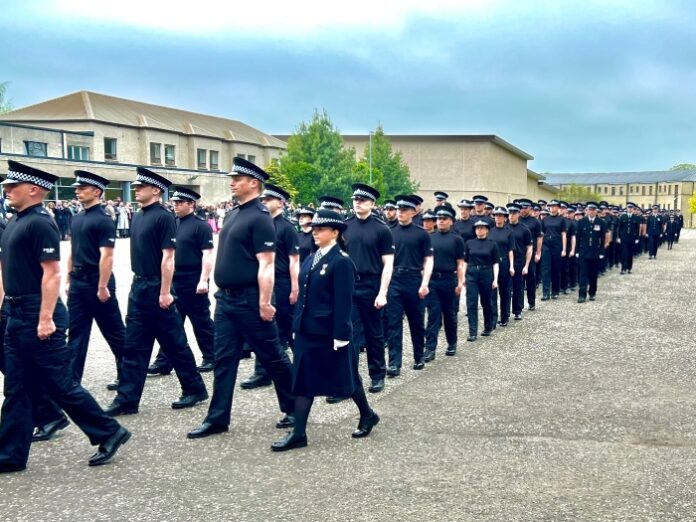Police in Scotland have said their job will be made “more difficult” by the chief constable saying the force is institutionally discriminatory.
Sir Iain Livingstone made the remarks on Thursday as he delivered a report to the Scottish Police Authority (SPA) board.
It was believed to be the first statement of its kind by a police chief.
He said: “It is the right thing for me to do, as chief constable, to clearly state that institutional racism, sexism, misogyny and discrimination exist.
“Police Scotland is institutionally racist and discriminatory.”
However, he stressed he did not mean individual officers and staff were racist or sexist.
David Threadgold of the Scottish Police Federation, which represents officers, said police had been “deeply offended”.
He said members of the public would not distinguish between institutional problems and individual officers.
Chief’s remarks related to an independent review

The Chief’s remarks came after a review uncovered first-hand accounts of racism, sexism and homophobia by serving officers.
The independent review group urged the force to be alert to “backlash” against efforts to improve matters, and particularly to be aware of “all lives matter” views.
First Minister Humza Yousaf said that, as a person of colour, the admission of was “monumental” and “historic”, while chair of the Scottish Police Authority board Martyn Evans called it a “watershed moment”.
However, Mr Threadgold, representing officers, said the reaction had been “overwhelmingly negative” among officers.
“That nuance in the delivery of the message was missed”
Initially speaking to the BBC’s Newsnight, he said: “The use of the phrase “institutionally racist” is one that has deeply offended and upset them and they do not recognise themselves in that way.
“That nuance in the delivery of the message was missed absolutely and there is real potential that that has damaged the relationship between the chief constable and those who represent the communities in Scotland.”
Sir William Macpherson’s definition of institutional racism, set out in his 1999 report into the killing of black teenager Stephen Lawrence, is the collective failure of an organisation to provide an appropriate and professional service to people because of their colour, culture, or ethnic origin.
It can include processes, attitudes and behaviour which amount to discrimination through unwitting prejudice, ignorance, thoughtlessness and racist stereotyping.
The public will also not make the distinction of “institutionally” racist, Scottish Police Federation said
However, Mr Threadgold told BBC Radio’s Good Morning Scotland that the vast majority of officers perceived the chief constable was “labelling them as institutionally racist”.
As a result, he said he believed the job of police officers had been made more difficult by Sir Iain’s comments.

He said: “The reason for that is they [the public] will hear him speaking and they will also not make that distinction.
“So when they [officers] are out patrolling in the streets around Scotland this weekend, members of the public will see them, they will make the link to the fact that the chief constable has said that we as an organisation are institutionally racist and that will make our job more difficult.”
Asked whether the force’s priority should be the individuals who experience racist or sexist behaviour, Mr Threadgold said: “It should be as equal a priority as everything else.
“The question is how are we going to do that in times when our organisation is so challenged financially that we cannot dedicate the resources to train people?”
Both Mr Threadgold and Sir Iain accepted there are examples of officers in the force who are discriminatory.
Chief Constable Sir Iain Livingstone: “I think it’s important to state it as a fact so that we can make progress”

The chief constable also told the BBC he “totally accepted” how institutional discrimination could be conflated with individuals.
However, he said: “Part of my own personal assessment of why I’m saying this now relates to that. I was reluctant to accept institutional racism, institutional discrimination, because I felt that unfairly condemned my colleagues… or that it suggested no progress had been made since the 1990s – that’s wrong.
“This is separate matter, this is about policies, practice, systems that have at times unintended or unforeseen consequences that actually discriminate against certain groups.
“I think it’s important to state it as a fact so that we can make progress and make policing and Scotland a better place.”
“Policing Together” was launched last year to tackle discrimination
Last year Police Scotland launched a four-year strategy called “Policing Together” to tackle discrimination in the force and in the community.
It recently announced a mandatory leadership programme to be rolled out to about 5,000 officers and staff to improve the existing workplace culture.
Earlier this year the force also stepped up its vetting procedures in response to the case of David Carrick, who admitted dozens of rape and sexual offences as a Met police officer.
(Source: BBC)
(Images: Social Media and Police Scotland)










